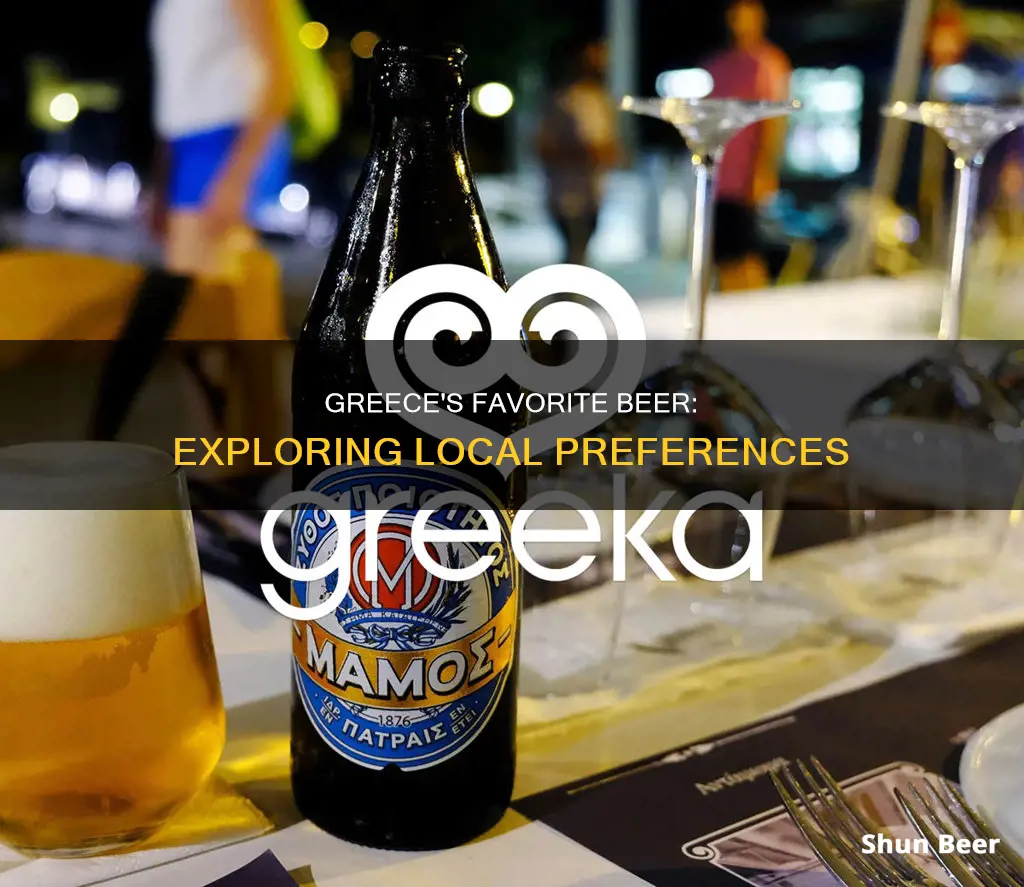
Drinking is a communal activity in Greece, and alcohol consumption has always been a part of the country's culture. While Greece is traditionally a wine-drinking country, beer has become increasingly popular. In fact, in 2014, beer production in Greece reached 3.75 million hectolitres, and the industry provided over 60,000 jobs.
The first modern Greek brewery was founded in 1864, and today, there are many breweries and microbreweries across the country. So, what beers do people drink in Greece? Some of the most popular brands include Mythos, Fix, Alfa, Amstel, Heineken, and Vergina.
| Characteristics | Values |
|---|---|
| Most popular beer | Mythos |
| Other popular beers | Alfa, Fix, Amstel, Heineken, Vergina |
| Beer style | Lager, pilsner, IPA, dark lager, blond lager |
| Beer ABV | 4.7% |
| Beer consumption in 2014 | 3.845 million hectolitres |
What You'll Learn

Popular Greek beer brands
Greece has a rich history of beer production and consumption, with unique styles such as blond lager, dark lager, pilsener, and IPA. While wine is still the most commonly consumed alcoholic beverage in Greece, beer has increased its market share and become an important industry for the Greek economy.
One of the most popular beers in Greece is Mythos, a light straw-coloured lager with 4.7% alcohol content. Mythos is widely consumed and can be found all over the country. It is known for its compatibility with seafood dishes, offering a refreshing contrast to the rich flavours of the sea.
Another popular Greek beer is Alfa, which is produced by the Athenian Brewery and made exclusively with Greek barley, giving it a light taste. Alfa has been brewed in Greece for over 30 years and is one of the oldest beer brands in the country.
Fix is also a large Greek brewery, with a long history dating back to 1850. The brewery closed down in the late 20th century but reopened under new administration in 2009. Fix Hellas is a premium lager with a soft flavour, balanced bitterness, and a long-lasting aftertaste.
Vergina is another well-known Greek beer, produced by the Macedonia Thrace brewery. It is a blonde lager with a complex bouquet and a full-bodied flavour. Vergina has a transparent golden hue and a foamy white head, making it an inviting choice for beer enthusiasts.
In addition to these large breweries, there are also many microbreweries in Greece, offering unique and innovative beer styles. For example, the Piraiki Microbrewery produces a blond pilsner with an elegant perfume and a brown pale ale with a fruity flavour. The Rethymnian beer, originating from Rethymno in Crete, is an organic beer with a fresh and authentic taste.
Greece's beer landscape is diverse and exciting, with a variety of styles and flavours to cater to different tastes. Whether you're a seasoned beer connoisseur or a casual enthusiast, exploring Greek beers is a great way to discover the country's rich culture and heritage.
Kayaking and Beer: New Hampshire's Legal Limits
You may want to see also

Greek beer history
Ancient Greece
Beer has been consumed in Greece for thousands of years, with archaeological evidence suggesting that the Ancient Greeks drank beer as early as the Bronze Age (3300 to 1200 BC). However, wine was the more popular beverage, with the Ancient Greeks even having an official God of Wine, Dionysius.
Beer was introduced to Greece via Northern Europe, and the Ancient Greeks considered it an inferior beverage, as it was easy to make and a little expensive. They also associated it with Northern Europe, the place where "barbarians" lived.
There is some evidence of beer drinking and storage at archaeological sites, and beer is mentioned in Ancient Greek literature. For example, Xenophon mentions beer in his "Anabasis", and Sophocles also mentions it, though only in the context of advising people to stay away from it.
19th Century
Greece's wine culture remained prominent until the 1800s. The first king of Greece, Otto of Greece, settled in the country in 1832, bringing scientists and specialists from his native land Bavaria, with the intention of developing the beer industry. Small breweries were set up in the 1840s to serve Bavarian officials and military men.
20th Century
The first official Greek brewery, Fix brewery in Athens, was founded in 1864 by Charles Johann Fuchs, son of Bavarian settler Johann Ludwig Fuchs. Beer was initially a rarity in Greece, only available in major cities. However, German travellers to Greece in the 1900s allowed beer consumption to grow, and similar German breweries were founded across the country.
21st Century
Beer consumption in Greece has increased by a factor of five since the 1960s. Most brands are found all over the country and are sold in supermarkets, mini markets and kiosks. In 2014, beer consumption in Greece came to 3.845 million hectolitres, or 36 litres per capita.
According to a survey by Avgeris et al., the three most influential factors when purchasing beer in Greece are price, origin and brand name. Price is the most significant factor, with 50.6% of respondents saying they would rather buy ‘cheaper’ beer. However, if money was not an issue, they would prefer to drink local beer.
Is Mixing Aleve and Alcohol Ever Safe?
You may want to see also

Greek beer styles
One of the most popular beers in Greece is Mythos, a light straw-coloured lager with 4.7% alcohol content. It is widely consumed and pairs well with seafood dishes, offering a refreshing contrast to their rich flavours. Another popular beer is Alfa, produced by the Athenian Brewery using exclusively Greek barley, resulting in a light taste. Fix, the first official brewery of Greece founded in 1864, also has a significant presence in the market.
In addition to large breweries, Greece is home to numerous microbreweries that introduce innovative styles, highlighting local ingredients and flavours. For instance, the Piraiki Microbrewery offers a blond pilsner with an elegant perfume, while the Rethymnian Brewery produces an organic beer with a fresh, authentic taste. The Santorini Brewing Company stands out with its Volkan Beer, incorporating local grape honey, citron leaves, and mineral water filtered through volcanic lava to create a unique flavour.
The Greek beer scene is not just about traditional styles but also embraces innovation, as seen in the recent growth of microbreweries and the heightened demand for specialised products. With its blend of ancient roots and modern craft beer trends, Greece's beer culture promises an exciting adventure for enthusiasts to explore and savour.
Real Beer on Bonanza: Fact or Fiction?
You may want to see also

Greek microbreweries
While Greece is well-known for its wine and ouzo, the country has also developed a thriving microbrewery scene. In fact, almost every region of Greece now produces its own beer, with microbreweries popping up all over the country, challenging the larger, better-known brands.
The first modern Greek brewery was founded in 1864, but it wasn't until the economic crisis that microbreweries really began to flourish. Despite the challenging economic climate, entrepreneurial Greeks turned to catering to more specific consumer groups, producing quality products with an eye to the international market. This trend towards specialised products and Greek brands supporting the local economy has continued, with around 65 microbreweries active in Greece in 2020, up from just 6 in 2009.
Noctua Brewery, Athens
Located in downtown Athens in the Gazi district, Noctua produces 13 beers, including the highly-rated 'Night Vision' black IPA.
Strange Brew, Athens
Also in Athens, just south of the Acropolis, Strange Brew offers 18 beers on tap, including the 'Dr Haze' imperial IPA and 'The Wizard' imperial stout.
Local Pub, Athens
In the Halandri district, just north of downtown Athens, the Local Pub combines a cosy courtyard bar with a brewery, offering almost 50 different beers.
Kykao, Patras
One of Europe's most creative microbreweries, Kykao was started by five friends who turned their passion into a business. In just three years, they have marketed more than 60 different beers, including some world firsts like 'reverse-engineered wines', which emulate Greek wines.
Nissos, Tinos
The first Aegean microbrewery, Nissos offers a complete beer experience with six brews, tastings, pairings, seminars, and merchandise. Their Bohemian Pilsner won the European Silver Star award in the pilsner category.
Siris Microbrewery, Serres
Producing the Voreia range of beers, the Siris Microbrewery makes beers aimed at connoisseurs who enjoy combining their brew with other culinary delights. Their beers come in eight varieties, including stout, pilsner, and wheat.
Chios Microbrewery, Chios
Chios Brewery offers a wide range of beers, from lagers and blonde ales to smoked porters and imperial stouts. They also produce a unique beer made with the island's famous mastiha resin.
Septem, Evia
Debuting in 2009, Septem offers a different beer for every day of the week. In 2014, their 'Sunday's Golden Honey Ale' won the bronze medal at the International Beer Challenge.
Solo, Crete
Operating between Heraklion and the small village of Alagni, Solo calls each of their six beers "a craft beer with soul". Their delightful motto is "Good beer is a human right".
The Beers of Supernatural: A Drinking Guide
You may want to see also

Pairing Greek beer with food
Although Greece is more famous for its wine, beer pairs surprisingly well with the Mediterranean cuisine served in the country. With the array of flavour profiles that you can develop with fresh ingredients like juicy lemon, fragrant mint, tangy olives, creamy yoghurt, pungent garlic and nutty olive oil, there are many creative possibilities for delightful taste combinations when pairing Greek food with beer.
Pale Ales
Pale ales are golden to amber in colour, often a bit fruity, with a hoppy, woody taste. They are an ideal choice to serve with lamb dishes, as the complexity of the beer complements the strong flavours of the meat. This full-bodied ale also works with spicy moussaka, as it can stand up to hearty flavours. The bitterness of the ale balances the heaviness of fried fish and seafood, so pair it with kroketes (a Greek fish cake) or breaded calamari.
Lagers
Spanakotiropita, a classic Greek pie made of phyllo dough, spinach and cheese, pairs deliciously with lagers. The smooth, malty flavour complements the phyllo dough crust and highlights the creamy cheese. The light taste of lager also serves as an aperitif to awaken your appetite without filling you up too much. Pair lager with Greek appetisers such as roasted artichokes or keftedes (small ground pork meatballs), as it does not overwhelm delicate flavours.
Belgian Beers
Deep, rich beers from Belgium pair well with heavier Greek fare. Their smooth taste is often deceiving; these beers are infamously high in alcohol content. The lighter body of the brew comes from the use of Belgian candy sugar. Serve a tripel with grilled lamb; the mild sweetness and creaminess of the brew offset the smokiness of meat off the grill for a mouthwatering combination. Tripels also work with gyros as their flavours blend with a garlicky tzatziki sauce. The flavours in triples complement fresh herbs, so they are an especially good match to serve with pasta or seafood with fresh basil or oregano.
White Beers
White beers with citrus notes pair well with a Greek salad. Serve this beer with feta since the light crispness of the brew balances the richness of the cheese. White beers also work well with egg dishes like Greek omelettes and frittatas. Offer white beer when serving fruity desserts; the mild sweetness of the beer balances the tanginess of the fruit. Melitinias, sweet cheese mini tarts often served in Santorini, work well with the creaminess of white beers. Pair white beer with desserts that feature lemon and honey, such as kataifi, a Greek pastry.
Porters
Porters are a robust, dark beer originating in England and brewed using roasted malted barley. The intense, complex flavours of this beer complement dessert. Baklava, a luscious Greek pastry made of nuts, honey and cinnamon, pairs with a deep, dark porter with coffee and chocolate notes. Karythopita, a moist cake made with walnuts and cinnamon, also complements the heavier body of this beer.
Beer and Liver Health: Enzymes and Alcohol
You may want to see also
Frequently asked questions
Some popular beers in Greece include Mythos, Alfa, Fix, Amstel, Heineken, Mamos, Vergina, and Volkan.
Some unique Greek beer styles include blond lager, dark lager, pilsener, and IPA.
The most popular beer in Greece is Mythos, a 4.7% lager introduced in 1997.
Beer has a long history in Greece, with evidence of beer production and consumption dating back to the Bronze Age (3300 to 1200 BC). However, wine was traditionally favoured in Greece, and beer was considered 'barbaric'. The modern Greek beer culture emerged in the 19th century due to the influence of Bavarian settlers and King Otto, who brought beer brewing specialists to the country.







